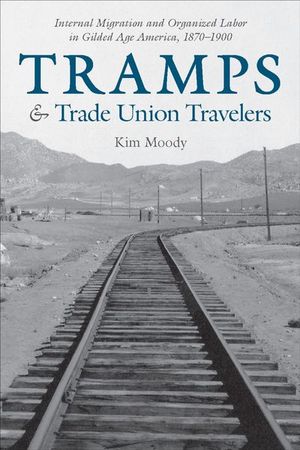Tramps & Trade Union Travelers
Published by Haymarket Books
From the author of On New Terrain, a historical examination of why American workers never organized in early industrial America and what it means today.
Why has there been no viable, independent labor party in the United States? Many people assert “American exceptionalist” arguments, which state a lack of class-consciousness and union tradition among American workers is to blame. While the racial, ethnic, and gender divisions within the American working class have created organizational challenges for the working class, Moody uses archival research to argue that despite their divisions, workers of all ethnic and racial groups in the Gilded Age often displayed high levels of class consciousness and political radicalism.
In place of “American exceptionalism,” Moody contends that high levels of internal migration during the late 1800s created instability in the union and political organizations of workers. Because of the tumultuous conditions brought on by the uneven industrialization of early American capitalism, millions of workers became migrants, moving from state to state and city to city. The organizational weakness that resulted undermined efforts by American workers to build independent labor-based parties in the 1880s and 1890s. Using detailed research and primary sources, Moody traces how it was that “pure-and-simple” unionism would triumph by the end of the century despite the existence of a significant socialist minority in organized labor at that time.
“Terrific . . . An entirely original take on . . . why American labor was virtually unique in failing to build its own political party. But there’s much more: in investigating labor migration and the ‘tramp’ phenomenon in the Gilded Age, he discovers fascinating parallels with today's struggles of immigrant workers.” —Mike Davis, author of Prisoners of the American Dream
Why has there been no viable, independent labor party in the United States? Many people assert “American exceptionalist” arguments, which state a lack of class-consciousness and union tradition among American workers is to blame. While the racial, ethnic, and gender divisions within the American working class have created organizational challenges for the working class, Moody uses archival research to argue that despite their divisions, workers of all ethnic and racial groups in the Gilded Age often displayed high levels of class consciousness and political radicalism.
In place of “American exceptionalism,” Moody contends that high levels of internal migration during the late 1800s created instability in the union and political organizations of workers. Because of the tumultuous conditions brought on by the uneven industrialization of early American capitalism, millions of workers became migrants, moving from state to state and city to city. The organizational weakness that resulted undermined efforts by American workers to build independent labor-based parties in the 1880s and 1890s. Using detailed research and primary sources, Moody traces how it was that “pure-and-simple” unionism would triumph by the end of the century despite the existence of a significant socialist minority in organized labor at that time.
“Terrific . . . An entirely original take on . . . why American labor was virtually unique in failing to build its own political party. But there’s much more: in investigating labor migration and the ‘tramp’ phenomenon in the Gilded Age, he discovers fascinating parallels with today's struggles of immigrant workers.” —Mike Davis, author of Prisoners of the American Dream
BUY NOW FROM
COMMUNITY REVIEWS
